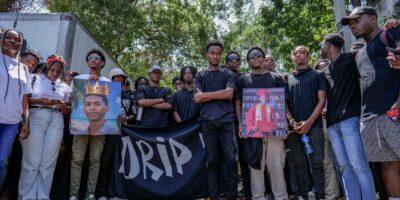AyiboPost has just obtained the final report from the Anti-Corruption Unit (ULCC) regarding corruption allegations against three members of the Presidential Transition Council (CPT). This document, different from the executive summary, reveals a corruption pact between the parties involved, according to Me Samuel Madistin
The president of the National Credit Bank (BNC), Raoul Pascal Pierre-Louis, arrived at the Oasis Hotel on the afternoon of May 25 for a meeting with presidential advisor Louis Gérald Gilles.
Before this meeting, organized by Gilles, Pierre-Louis said he had received several « requests » related to the renewal of his position at the public institution. The five-member board’s term was about to expire, with three members no longer serving.
At the hotel, Gilles directed Pierre-Louis to room 408, registered under Lonick Léandre, a consul. There, two other presidential advisors, Smith Augustin and Emmanuel Vertilaire, were waiting.
During the meeting, Gilles demanded 100 million gourdes from the BNC director to ensure his reappointment. Pierre-Louis said he didn’t have the money and instead offered to facilitate loans from the BNC for the advisors, provide them with credit cards, or give them a list of the bank’s unused assets.
For reasons not yet clarified, Pierre-Louis—who has since been dismissed by the government—reported the advisors in a letter to the Prime Minister’s Office on July 24, 2024. This report came after credit cards with limits of $13,500 to $20,000 were distributed to the four key players. Pierre-Louis had personally approved these limits outside of BNC’s standard procedures.
This account comes from the final ULCC report, which was obtained exclusively by AyiboPost. According to this document, the negotiations for the credit cards began before the May 25 meeting, and the director was responsible for paying the expenses incurred by the advisors, per the pact.
Smith Augustin requested his credit card on May 15 but made his first transaction two days after the May 25 meeting, according to the report’s expenditure table.
Smith’s credit card was later blocked due to non-payment, despite him receiving a monthly salary of 220,000 gourdes, a check representing one-third of his salary for operational expenses, 400,000 gourdes for housing, 25 million gourdes for intelligence services, 400,000 to 500,000 gourdes on a prepaid card, 250,000 gourdes in fuel vouchers, and 20,000 gourdes for phone expenses, according to his statements to ULCC investigators.
The consul, Lonick Léandre, identified in the report as a friend of Augustin, also requested his card on May 15. His first transaction was recorded three days later.
Emmanuel Vertilaire and Gérald Gilles received their cards two days after the May 25 meeting and began using them on June 1.
Most of the key players made minimal repayments after the ULCC investigation began, according to the final report. They told investigators that they had obtained the cards legally and promised to repay the amounts spent. However, the legality of the cards’ issuance was disputed by the bank staff interviewed by the ULCC.
As part of this case, advisor Vertilaire secured employee transfers and promotions at the BNC in the North, « outside of administrative procedures, » according to the ULCC, which said it had « reliable information about the exchanges that cannot be separated from the context of the negotiations. »
It remains unclear why Raoul Pascal Pierre-Louis ultimately decided to report the three members of the Presidential Transition Council in a letter to the Prime Minister’s Office, and in testimony to a justice of the peace. In doing so, he admitted to making offers and providing the credit cards to the advisors.
The ULCC recommends that legal action be taken against the three advisors for abuse of office, bribery, and passive corruption, and that charges also be brought against Pierre-Louis for active corruption, abuse of office, and bribery.
To understand the legal and political implications of the scandal, AyiboPost consulted with lawyer Samuel Madistin. He is the head of the Je Klere Foundation, a human rights organization.
From a legal standpoint, the ULCC report reveals only one significant fact: the existence of a corruption pact between the implicated presidential advisors and Raoul Pascal Pierre-Louis, according to Me Madistin.
What is considered a relevant fact in criminal law?
In criminal law, we distinguish between allegations, facts, established facts, and relevant facts.
Allegations are impressions or deductions—anything that cannot be proven.
A fact is anything that can be proven by any means of evidence. Established facts are those that are proven or uncontested. A relevant fact is one that makes sense, connects a fact to the evidence, and is capable of convincing a judge.
Based on the ULCC report, the existence of the corruption pact between the presidential advisors and Raoul Pierre-Louis can be considered relevant for the following reasons:
- Emmanuel Vertilaire requested and obtained from Raoul Pascal Pierre-Louis appointments, transfers, and promotions for his associates in the North.
- Credit cards were issued, in violation of the bank’s regulations, to the three advisors and consul Lonick Léandre, who provided his hotel room for the meeting.
- Raoul Pascal Pierre-Louis told investigators that the advisors were to use the cards, but it was his responsibility to cover the expenses.
- Despite the advisors’ substantial monthly incomes, they quickly made large charges on the cards and only began repaying after the ULCC investigation started.
- The meeting took place secretly in a hotel room, not at the official government residence.
- The CPT president was unaware of the meeting, and no report was made to him or other advisors after it.
- A private dinner followed the meeting.
- Suspicious WhatsApp messages were exchanged between the key players.
Although the demand for 100 million gourdes might not yet be considered a relevant fact, but rather an allegation at this stage of the investigation, the other facts presented are pertinent regarding the corruption pact.
After the facts, the debate centers on the status of the accused individuals, continues Me Madistin.
Can presidential advisors be prosecuted in ordinary courts due to their positions? Do they benefit from immunity under the constitution?
There is great hypocrisy in referencing the constitution to determine the status of the presidential advisors, Me Madistin continues.
The CPT, like the Conille government, does not fall under the constitution. The constitution is not in effect. It’s a de facto government operating outside what could be called crisis law—a text that would define the nature of the government in relation to the constitution with non-applicable provisions during the crisis, reinforced by consensual provisions for the crisis period only. Such a text does not exist today.
Even though the constitution is not in effect, some constitutionally guaranteed rights, such as intangible rights (right to life, prohibition of torture or cruel or inhumane punishment, prohibition of slavery or servitude, non-retroactivity of criminal law), or certain fundamental rights must be respected, even in the absence of legal or de facto political regimes.
The presidential advisors appoint the Prime Minister, sign orders and decrees, and form the government and the Provisional Electoral Council (CEP). It is hard to argue that citizens exercising such functions would not benefit from immunity typically attached to such roles.
In my view, all presidential advisors enjoy immunity. However, they are not subject to the High Court of Justice, which does not exist; they are subject to ordinary courts.
By voluntarily appearing before the ULCC investigators, advisors Louis Gérald Gille, Emmanuel Vertilaire, and Smith Augustin have waived their immunity. They can no longer invoke it in this case, and legal proceedings can now be initiated against them as usual.
Politically, the advisors benefit from the presumption of innocence, but ethically, it is a different matter.
Ethics involves making moral judgments about political actions. Can citizens still trust leaders perceived as corrupt? In light of the accusations against them, the implicated advisors should resign. This is an ethical issue, concludes the lawyer.
The Council stated that it acknowledged the investigation report on Friday, October 4. The political structure announced that it would soon take « all necessary measures to ensure the stability of the State, the interests of the nation, and the proper functioning of the institution. »
Cover image edited by AyiboPost featuring the three members of the PTC: Louis Gérald Gilles, Smith Augustin, and Emmanuel Vertilaire, accused of corruption.
Keep in touch with AyiboPost via:
► Our channel Telegram : click here
► Our Channel WhatsApp : click here
► Our Community WhatsApp :click here







Comments